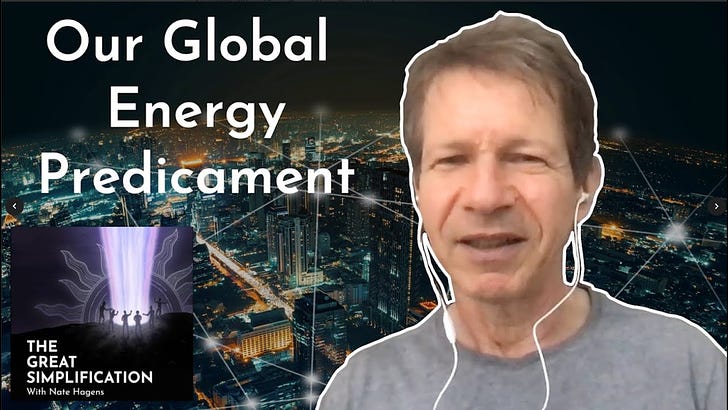This Week…
Today, I’m pleased to be joined by well-known (in France!) French educator Jean-Marc Jancovici to discuss the critical importance of energy to modern economies. Jean-Marc and I have both been working at the intersection of energy, economics, and climate for over two decades - yet had never seen each other's work. In this - our first conversation - we break down the fundamentals of our complex, growth dependent global economic system. For a lifestyle so centered around access to cheap, surplus energy, what would it mean to lose our abundant supply of fossil fuels - and how would the people who have become used to it react?
Jean-Marc Jancovici is a founding partner of Carbone 4, a Paris based consultancy and data provider specializing in low carbon transition, biodiversity impacts, and physical risks of climate change (www.carbone4.com). He is the founder and president of The Shift Project, a Paris based think tank advocating for a low carbon economy (www.theshiftproject.org). Jean-Marc Jancovici is also an associate professor at Mines ParisTech, member of the French High Council for the Climate, and (co-)author of 8 books and the website jancovici.com on energy and climate change issues. Jean-Marc Jancovici is a graduate from École polytechnique and Télécom ParisTech.
Will a shift in society’s institutions and expectations need to be forced upon us in a time of urgent change or is it possible for nations and societies to anticipate declining energy availability - to actively simplify before we are forced to by circumstances?
In case you missed it…
In the fourth and final part of this Frankly mini-series, I suggest responses that reside in the intersection of the ‘Four Horsemen of the 2020s’ and the ongoing/accelerating risks to Earth's ecosystems, and the web of life. What can we do? How can pro-future thinkers reconcile ‘Just Stopping Oil’ when the Superorganism dynamic of the global economy will continue trying hard to ‘Keep Pumping Oil’? Here I briefly outline 10 ‘guideposts’ that could benefit both post-growth human economies as well as protecting Earth’s biodiversity.
What we teach our 18-22 year olds around the world matters - a great deal. On Sunday, I was joined by Jon Erickson, Josh Farley, Steve Keen, and Kate Raworth - all of whom are leading thinkers and educators in the field of heterodox economics - to discuss the fundamental aspects of what conventional economics gets wrong and how it could be improved in our education system. Who is finding the models and systems that economists have created useful - and how does economics as a discipline need to change in the face of a lower energy future?
If you appreciate The Great Simplification podcast…
Be sure to leave a review on your preferred podcast platform! Leaving reviews helps the podcast grow, which helps spread awareness of our systemic situation from experts in ecology, energy, policy, economics, technology, and community building so that we can better understand - and respond to - the challenges of the coming decade.
The Great Simplification podcast is produced by The Institute for the Study of Energy and Our Future (ISEOF), a 501(c)(3) organization. We want to keep all content completely free to view globally and without ads. If you’d like to support ISEOF and it’s content via donation, please use the link below.






What a great podcast episode with Jean-Marc Jancovici. Coming from Europe (The Netherlands) I did not know of Jean-Marc Jancovici and his work. Thank you for sharing Nate. I saw your emergent learning and was learning myself too. The similarities between both your visions were astonishing. I have the idea that the carrying capacity for the vision of the great simplification has just been doubled! My eyes were sometimes filled with tears from joy. Sometimes I was smiling. Merci beaucoup!
Jean-Marc Jancovici: “Le Mond sans fin is going to be released in the US.”
TIP: There is already an English version of this book (kind of graphic novel) available, maybe not tuned to the US, but very informative, readable and funny:
“World without end” by Christophe Blain and Jean-Marc Jancovici. Available as e-book.